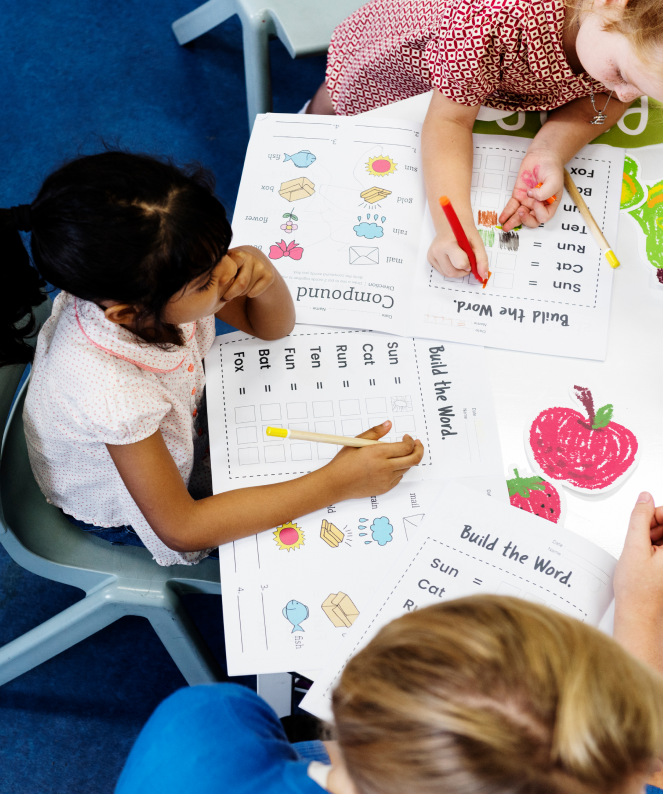Why Is Project Based Learning Important?
Why Is Project Based Learning Important?
Published: Friday, January 14, 2022
Why Is Project Based Learning Important?
A lot of tutoring centers focus on preparing students for testing to assess their knowledge. But the real world doesn’t function on exams. It functions based on projects. Project based learning helps your child gain real-world skills they will use in college, work, and their every day lives.
When you hear ‘project based learning’ you may have flashbacks of arts and crafts full of glue sticks, paperboard, and tons of hands-on parental supervision requiring more of your time and effort. Never fear because we’re not talking about that kind of project!
When we say project based learning today we don’t just mean doing projects. We mean real-world, hands-on opportunities for children to apply their education to everyday problems. Rather than just a ‘dessert project’ that adds to in-class learning, PBL is the main course of the unit.
Let us explain what we mean by project based learning, and why it’s so important to education, at all levels.
The old way of education and learning
Odds are, when you went through school you remember memorizing facts, following the teacher’s direction, and taking paper-based exams. However, education has evolved from there. Nowadays, students can actively participate in learning by tackling real-world problems, questions, or scenarios.
Instead of the teacher imposing ideas on students, project based learning allows students to learn from their own hands-on experience. With project based learning, students can gain a deeper understanding of a topic by solving real-world challenges over a longer period of time.
What is project-based learning?
Project based learning (PBL) is a teaching method where students engage directly with the learning by pursuing real-world projects. PBL is typically a long-term project where students can manage their own time and is typically a group effort that can range from small groups to an entire class. It can take many forms, including meaningful work like water quality projects, community development, sustainability efforts, and more. The possibilities are endless but PBL is most effective when it is both personally meaningful to the students and accomplishes a learning objective.
Of course, traditional learning is still important as students will need to apply what they learn in the classroom to real-world projects. And students may bring in ideas from multiple disciplines to solve the problem. Additionally, unlike in traditional education, instead of measuring a student’s success solely on exams and rote memorization, with PBL the emphasis is on how students apply learning to the real world.
In PBL, trial and error is the main teacher while the instructor is there to facilitate and help children reach their potential. Plus, it’s not just for older students. PBL can support all levels of education, including elementary school, middle school, high school, and college.
Project based learning helps students solve unstructured problems creatively while collaborating and communicating with others
PBL is a collaborative process, and students will learn to do group work that requires creativity, communication, and innovation. Students will learn to work in groups while gaining independence from the teacher.
Furthermore, students will need experience collaborating and communicating well with others for their future education and civic life, and it may even inspire a future career. For instance, students may participate in a moot court, preparing arguments for an actual case. Or they may examine their environmental footprint, build a student farm, or even design an app.
Finally, students may need to present the final product or presentation to a real audience at the completion of the project, allowing them to practice their communication and public speaking skills.
Project based learning helps students get more engaged and interested about the material
PBL encourages students to take a hands-on approach to their education, putting them in the driver’s seat. If it scares you to give that responsibility to your kid, put yourself in their shoes. They want to take ownership, and when they do, they are more likely to become independent, grow their confidence, and ultimately, find success. Furthermore, when students have ownership over their education their attitude towards learning changes, and they become more engaged with the material.
Project based learning supports success on standardized testing and advanced placement exams
Even though traditional examinations are not the focus of PBL, schools that participate in PBL have been known to raise their average test scores. Studies from Lucas Education Research have found that students in PBL classes outperform students in traditional classes when it comes to standardized exams and AP tests. Part of the reason for this is that when working on a real-world project, students have to focus on critical thinking skills; they beyond just memorizing information to critically applying it. this makes them overall better thinkers and better at answering questions, including on standardized testing.
Project based learning supports deeper learning
To solve a real-world issue, students will need to bring in learning from multiple disciplines and will need to demonstrate understanding beyond rote memorization. Therefore, they often retain skills and concepts better than when simply tested on the material. Furthermore, students can advance more quickly when working on a project because the sky is the limit. Thus, students can work on projects that appropriately challenge them to engage in deeper learning.
Try PBL education now
You may be wondering why you didn’t do more project based learning in school. Well, it’s not too late to inspire your child to get started. Especially if your child is struggling with Math or English, project based learning may be a good option to help support their deeper learning. We offer English and Math tutoring with project based learning. Schedule your child’s FREE Math & English evaluation now to learn more and see if PBL may be appropriate to advance your child’s education.


